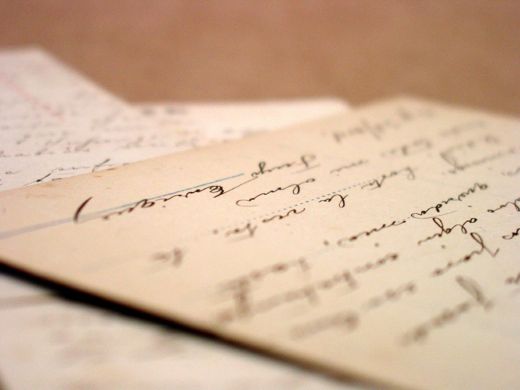How Well Do You Know Your Parents?
 I couldn't come up with a clever title for this one. And that kind of bothers me because I love clever titles. Oh well.
I couldn't come up with a clever title for this one. And that kind of bothers me because I love clever titles. Oh well.
I've been meaning to write this post for quite some time and I won't delay any longer. Fellow blogger Catherine at Her Bad Mother recently lost her father. The death was unexpected. A few weeks ago, Catherine wrote a haunting post called The Unbearable Lightness of Letters wherein she talks about the experience of going through her father's effects and finding love letters from a woman with whom he had an affair. Catherine defends her decision to keep these letters, likening them to "sacred artifacts."
In this particular post, Catherine justifies her decision to seize and hoard her father's effects, to cling tight to "every clue, every testament, every little thing," even though she admits this is hurtful for her mother who is still alive. And even though this decision might run contrary to conventional wisdom. Many of us, it seems, might choose ignorance over information when it comes to our parents. Catherine alludes to a friend of hers, who, upon discovering evidence of her late aunt's past loves, felt compelled to destroy all such evidence in her own life. Catherine notes that she understands this common impulse to protect our loved ones, particularly our children, from "the full force of ones history," but she questions whether this impulse is "the right one."
I'm not sure whether impulses can be right or wrong, but it's an interesting question. As is the question of whether we can ever truly know our parents. Catherine bemoans the reality that our knowledge of others, particularly of our parents, is necessarily partial. We know our parents as, well, parents. From time to time, we are afforded glimpses of them as people, but these are just glimpses. She states, "I believe that it is an act of love, to seek to know someone as fully as one can. In part because I believe that he was extraordinary, and so that he should be known, and that I will be enriched by knowing him better. In part because I believe that in understanding him, I will come to a better understanding of myself. Because as well as I knew him, I only knew him partially, incompletely. I want to know him better."
I haven't given this enough thought, but I think I fall into the ignorance is bliss category. I would rather not know every detail about my parents' lives before they met one another, or before they had me. I would rather my girls not know every detail about my life before meeting Husband or before welcoming them into this wily world. Then again, I remember, and vividly, a plane trip with Husband where I grilled him on all of his ex-girlfriends. He couldn't understand why I needed to know the minutiae about relationships that predated ours, but I insisted that knowing these things meant knowing him.
I think there is perhaps an important distinction to make here. Maybe the concept of learning new things about someone after death when there is no longer an opportunity for questions and answers and understanding is different than seeking knowledge about someone while they are here to know?
Here I am left wondering if we can never truly know ourselves if we don't know truly our parents? What is it to truly know someone? Is willed ignorance about our parents or our family of origin willed ignorance about ourselves? Would knowing more about our parents' hopes and dreams and fears and regrets and passions and mistakes help us make better sense of our own?
I don't know. I don't know. But these things are certainly worth thinking about.
_________________________________
How well do you know your parents? Given the choice, would you prefer to be shrouded in ignorance or information?